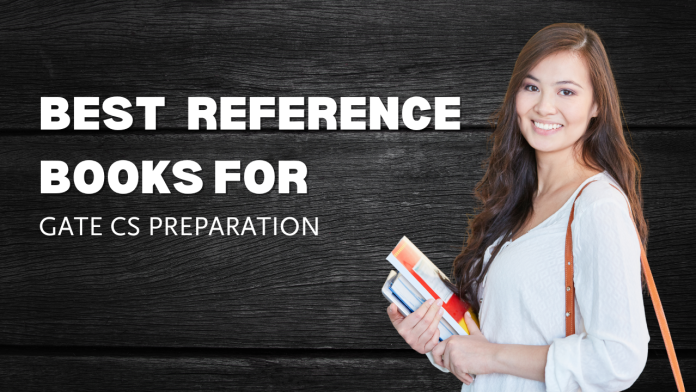Best Reference Books for GATE CS Preparation
Best Reference Books for GATE CS Preparation, Choosing the right reference books is one of the most crucial decisions in your GATE Computer Science (CSE) preparation journey. The books you select can define the quality of your understanding and the sharpness of your problem-solving skills. Think of them as the foundation of your preparation — they give you the conceptual clarity, in-depth theory, and rigorous practice needed to tackle even the most challenging GATE questions with confidence.
However, with so many resources available, students often get confused about which books to follow, how to use them effectively, and how to balance them with coaching materials and test series. The goal isn’t to read every book cover to cover — it’s to study smartly, understand deeply, and practice purposefully.
In this blog, we’ll break it down for you:
- List the top recommended textbooks for every major subject in GATE CS, from Algorithms to Operating Systems.
- Explain how to use these books strategically, so you build both theory and problem-solving speed.
- Show how Gate@Zeal’s notes, lectures, and test materials complement these textbooks, helping you focus on what matters most.
- Highlight common pitfalls — like using outdated editions, juggling too many books, or neglecting revision.
By the end of this blog, you’ll have a clear, structured roadmap of which books to trust, how to study from them effectively, and how to integrate them seamlessly into your GATE CS preparation plan with Gate@Zeal.
Why Reference Books Still Matter (Even with Coaching / Online Classes)
- Coaching or online lectures (like those from Gate@Zeal) offer structure, motivation, summaries, doubt support, and curated direction.
- But a book gives you depth, breadth, extra exercises, and backup when classes are missed.
- Gate@Zeal itself highlights on its “Best Study Materials” page that their resources are structured, concise, exam-oriented, and they supplement them with external textbooks when needed. Gate at Zeal
- Also, Gate@Zeal provides subject-wise PDFs, condensed notes, and important formula sheets to help you cross-reference and revise faster. Gate at Zeal
So, books + coaching = synergy. Use books to deepen and reinforce; use Gate@Zeal to guide, correct, keep you on track, and provide testing/analytics.
Recommended Books Subject-Wise
Below is a curated list of reference books that many top GATE CS rankers and coaches recommend. These are not all books you must read cover to cover — use them selectively for clarity, difficult topics, and additional practice.
| Subject | Recommended Book(s) | Why It’s Good / Usage Advice |
| Data Structures & Algorithms | Introduction to Algorithms by Cormen, Leiserson, Rivest, Stein | A “Bible” for algorithms, with rigorous proofs and many problems. Use it for deep understanding and tricky problems. |
| Data Structures & Algorithms Made Easy by Narasimha Karumanchi | More GATE-style problems, easier language, good for practice after basic reading. | |
| Discrete Mathematics / Theory | Discrete Mathematics and Its Applications by Kenneth Rosen | Covers combinatorics, graph theory, logic — useful for GATE’s discrete and design questions. |
| Introduction to the Theory of Computation by Michael Sipser | Excellent for automata, computability, and theory topics. | |
| Operating Systems | Operating System Concepts by Silberschatz, Galvin & Gagne | A standard book covering everything from process scheduling to memory management. |
| Modern Operating Systems by Andrew S. Tanenbaum | Offers alternative views, detailed examples, and clarity in certain OS topics. | |
| Computer Networks | Computer Networks by Andrew S. Tanenbaum, David Wetherall | Comprehensive treatment of protocols, layers, and assorted network topics. |
| Databases | Database System Concepts by Abraham Silberschatz, Henry F. Korth, S. Sudarshan | Well-known for conceptual clarity + many SQL and relational problems. |
| Fundamentals of Database Systems by Elmasri & Navathe | Good as alternate reference or to see different explanations. | |
| Computer Organization & Architecture (COA) | Computer Organization & Design by Patterson and Hennessy | Very good book for architecture, pipelining, memory hierarchy, etc. |
| Computer Architecture: A Quantitative Approach by Hennessy & Patterson | For advanced insight and high-level architecture understanding. | |
| Compiler Design | Compilers: Principles, Techniques, and Tools (the “Dragon Book”) by Aho, Lam, Sethi, Ullman | The classic book for compiler design topics — lexical analysis, parsing, code generation. |
| Engineering Mathematics | Advanced Engineering Mathematics by Erwin Kreyszig | For differential equations, linear algebra etc. |
| Probability & Statistics for Engineering and the Sciences by Jay L. Devore | For probability/statistics portions. | |
| General Aptitude / Verbal / Quant | A Modern Approach to Verbal & Non-Verbal Reasoning by R.S. Aggarwal | Good source for reasoning and verbal topics. |
| Quantitative Aptitude for Competitive Examinations by R.S. Aggarwal | Classic book to build speed in arithmetic, algebra, etc. |
Also, many aspirants cross-check lists from reputed sites (e.g. GeeksforGeeks’s recommended books list) for updated suggestions. GeeksforGeeks
How to Use These Books Smartly (Not Just Collect Them)
Many GATE aspirants fall into the trap of collecting books instead of mastering them. The goal isn’t to build a library — it’s to extract maximum value from each book you use. Here’s how to make your reference books work for you, not overwhelm you:
1. Start with coaching lectures or guided notes first
Before diving into textbooks, begin with your Gate@Zeal lectures, notes, or class outlines. These resources are structured around the GATE syllabus and exam trends. Once you’ve grasped the basic concept from class, refer to standard books only for deeper understanding or alternate explanations — especially for topics that feel unclear or need more examples.
2. Be selective — not every chapter is equally important
Most standard textbooks go far beyond the GATE syllabus. Don’t waste time reading everything. Focus on specific chapters and subtopics that directly align with GATE’s official syllabus and previous years’ questions. This selective approach saves time and ensures your energy is spent where it matters most.
3. Practice smartly, not exhaustively
Instead of solving every question in a book, bookmark or note down the GATE-style problems — the ones that test conceptual clarity or involve multiple concepts together. Solving a few high-quality problems is more beneficial than doing hundreds of repetitive ones. Remember, you’re training for precision under time pressure, not for a university exam
4. Cross-verify methods — blend the best of both worlds
When studying from books, always compare the author’s approach with what’s taught in
Gate@Zeal’s notes or classes. This comparative habit helps you discover faster, clearer, or more intuitive ways to solve problems. Over time, you’ll build your own optimized methods — a big advantage in a competitive exam like GATE.
5. Use books for revision and reinforcement
In the final months before GATE, use your textbooks to revisit formulas, tricky problems, and “high-yield” chapters. Books often explain concepts in ways that trigger recall and deepen understanding — perfect for final-stage polishing.
6. Maintain a “Book Index of Doubts”
As you study, create a small section in your notes or a spreadsheet to list topics or problems you couldn’t solve easily. Label them by book and chapter. During revision, revisit these areas — you’ll see measurable growth in your understanding and confidence.
7. Go beyond the test series
Books are your training ground for unexpected questions. While mock tests and test series cover patterns, books expose you to unique and challenging problems that sharpen your thinking. This extra edge can make the difference between a good rank and a top rank.3. Practice smartly, not exhaustively
Instead of solving every question in a book, bookmark or note down the GATE-style problems — the ones that test conceptual clarity or involve multiple concepts together. Solving a few high-quality problems is more beneficial than doing hundreds of repetitive ones. Remember, you’re training for precision under time pressure, not for a university exam.
Books help you face unusual or tougher questions beyond what test series covers.
How Gate@Zeal Supplements Your Book Study
Gate@Zeal is built to complement textbook study in multiple ways:
- Concise, curated notes, PDFs, flowcharts, formula sheets that reduce your need to search in dense books. Gate at Zeal+1
- Video lectures + concepts explained using multiple perspectives — sometimes simpler than book presentation.
- Test series & question banks based on book + exam difficulty, to test what you read in books.
- Doubt resolution & peer/mentor support — if you’re stuck on a book chapter, Zeal’s mentors help you clear the confusion quickly.
- Material recommendations — they often guide which textbook is best for a particular topic or how deep you should go.
Thus, your workflow can be:
Lecture / video → Zeal’s notes → textbook for deeper clarity → practice with problems → test on Zeal’s platform → analyze mistakes → revisit textbook + notes.
Pitfalls & How to Avoid Them
- Overloading on books – Don’t try to read every textbook fully. Stick to 3–4 core books and supplement from others only when needed.
- Using outdated editions – Always use recent editions; some topics (networks, architecture) evolve.
- Blindly practicing book exercises – Many exercises are unneeded; focus on GATE-relevant ones.
- Neglecting test integration – If you just read books without applying via tests, you won’t internalize. That’s where Gate@Zeal’s mock series is essential.
Suggested Book + Zeal Material Mapping (Example)
Here’s how you might pair books with Gate@Zeal material for a subject (say, Operating Systems):
- Read the Zeal video lecture / summary first
- Read relevant chapter(s) in Operating System Concepts (Silberschatz)
- Solve 3–5 tougher problems from the book
- Take Zeal’s OS subject test / mock
- Analyze mistakes, revisit book / lecture if needed
You can follow similar mapping for all subjects — books give depth, Zeal gives structure.
Final Thoughts & Strategy Tips
- A few well-chosen books + structured online / coaching support is far better than dozens of books haphazardly used.
- Gate@Zeal’s material, notes, doubt support, and testing environment help you use books efficiently and smartly, not waste time.
- Use books where coaching resources leave gaps or for stronger practice; avoid them in areas where Zeal’s content is sufficient.
- Always keep track of which chapters you’ve used, which problems remain unsolved, and gradually reduce full textbook reliance in final months — rely more on mocks, error logs, and revision.
FAQs
1. Should I read full textbooks for GATE CSE?
No, focus only on GATE-relevant chapters and topics. Quality matters more than quantity.
2. Which is better — coaching notes or standard books?
Use both. Start with coaching notes for structure, then refer to books for deeper clarity.
3. How many reference books should I use per subject?
One main book per subject is enough — avoid juggling multiple sources.
4. When should I revise from books?
During the last 2–3 months, revisit formulas, tricky problems, and high-weight topics.
5. How do books help beyond coaching materials?
They expose you to tougher, non-repetitive questions and strengthen your conceptual base.
Explore more:








